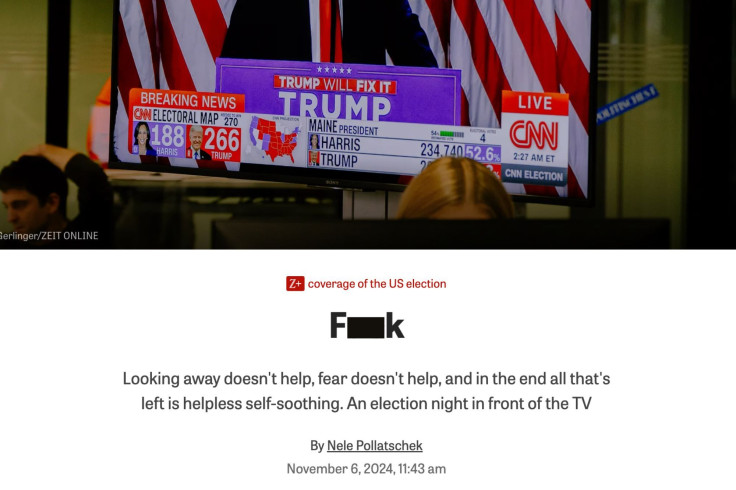Top German Newspaper Reacts to Trump Victory with One Word: 'F--k'
Writing from the perspective of German citizens, Nele Pollatschek addressed the feeling of watching the election results live into the early hours of the morning

A German newspaper responded to the news of former President Donald Trump emerging victorious in the 2024 presidential election with a one-word headline: "F--k."
Die Zeit, a weekly newspaper published in Hamburg, is one of Germany's most well-known publications. Founded in 1946, it frequently publishes longer, drawn-out articles including dossiers, essays, third-party articles and parts of lectures from various authors.
The paper published its reaction piece the morning after election night, addressing Trump's victory. The article outlined factors within Trump's incoming presidency that could result in worst-case scenarios for his political opponents.
"Last time, Trump's advisors stopped him from doing too much nonsense. Except that he replaced them for exactly that reason. That's why this time he has very explicitly surrounded himself with people whose core competence is loyalty," wrote Nele Pollatschek, the article's author, in German which was translated to English. "And yes, the Supreme Court, where Trump can replace two more judges and thus bind the judiciary ever closer to himself, further weakening the separation of powers and his own legal boundaries."
Pollatschek describes the panic that many felt set in as they watched the former President begin to lead on election night. Writing from the perspective of German citizens, Pollatschek addressed the feeling of watching the election results live into the early hours of the morning, being unable to sleep due to a deep-seated anxiety about results.
"Half past five is also a perfectly appropriate time for feeling helpless, for feeling sorry for yourself, for panicking and for sheer horror. Curiosity is at a low point in the early hours of the morning. The problem, of course, is that the story of Donald Trump has been exhausted since 2016," she writes.
Pollatschek then demonstrates the futility of fearful and frustrated emotions that arise after the election results are finalized, pointing out that nothing can be done to change them.
Pollatschek indicated that German sentiments pertaining to the American presidential election were unnecessarily impassioned, stating that these concerns exist as a result of American cultural imperialism.
"Fear is pointless. Especially since you are in Germany and can't really do anything except look or look away, it makes no difference. America doesn't care at all. And the intensity of German feelings about American elections is strange anyway," she wrote. "It lies somewhere between cultural imperialism and cultural appropriation."
Ultimately, Pollatschek echoed a sentiment many have expressed since Trump was declared the winner of the 2024 election: uncertainty.
"And OK, there was the attempted coup. But that was back then. That was a completely different situation. And American democracy is so old, it can handle it. The Egyptian Empire, the Roman Empire - everything that lasts a very long time lasts forever, we know that. And if not, if that was the last US election, at least people were watching. And now we can hardly wait to see what the next day will bring," she concluded.
Readers sounded off in the comments of the article, stating that Pollatschek's words made them laugh at a time when they felt hopeless.
"Nice piece, otherwise. I laughed," wrote one commenter.
"Great article, cheers me up a bit :)" concurred another.
"From the vomit bucket to the precise description of Trump's character - this article is a highlight, thank you very much! And despite all the depression: curiosity lives. Let's see how it continues. Even if you probably have to fight hard against the temptation to look away a few times," commented another, more optimistic user.
Trump was declared the winner of the 2024 presidential election by most major media outlets on Wednesday morning, following an intense battle with Vice President Kamala Harris for the nation's highest office.
Originally published by Latin Times.
© Latin Times. All rights reserved. Do not reproduce without permission.





















